© Rehab Center Parus/Wikicommons
For Timothy Leary, the acid-fuelled revolution whose prophet he had been didn’t really happen. President Richard Nixon called him “the most dangerous man in America”, but he never was. Later in life, he claimed that the “drop out” message just meant “drop out of conformity”; in other words, be different. But when he spoke at the Human Be-In at Golden Gate Park in 1967, drop out meant what everyone thought it meant, and he made that very clear: “Turn on, tune in, drop out. I mean drop out of high school, drop out of college, drop out of graduate school.” Most of those who dropped out during the flower-power hippy era, even at Leary’s University of California Berkeley college, where he gained his PhD (without having dropped out, of course), dropped back in again when faced with the prospect of having to earn a living. Sticking flowers in your hair, popping acid tabs and having unrestrained sex is all very well and endlessly amusing but eventually playtime has to come to an end for all of us. Leary died at his home in Beverly Hills in 1996 at the age of 75, not exactly forgotten but not regarded as very important. Among those who took his advice and dropped out before sitting their degrees, some did quite well: Steve Jobs, Bill Gates, and Mark Zuckerberg, for instance. But another drop-out, Steve Wozniak, came back and finished his degree after co-founding Apple. Many of the UC Berkeley alumni at that time of protests against the Vietnam War saw Leary and his slogan as a distraction from politics and therefore unwelcome. As the Cal Alumni magazine, California, puts it: “At Berkeley, politics still matter. Timothy Leary not so much.”
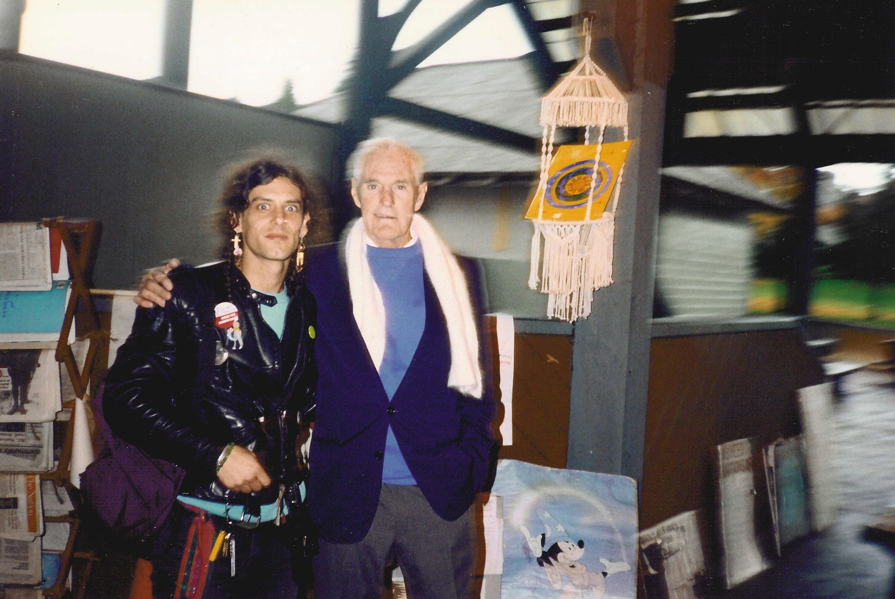
Seattle activist Vivian McPeak and countercultural icon Timothy Leary at PeaceWorks Park vigil, an anti-war protest action that occurred in Gas Works Park, Seattle, Washington, U.S. beginning Sunday, August 26, 1990 and carrying on through the end of the Gulf War.
We can only speculate on what he would have made of the lockdown and the sudden upsurge in drug usage that has resulted from it. He may not have been surprised, though, that much of the interest is coming from people who were young in the hippy era, and who may have adopted his slogan as the leitmotif of their youth. But time moves inexorably on. You can almost imagine groups of elderly men rushing around on their mobility scooters in packs; Hell’s Grandads. And Hell’s Grannies, too, of course, all with their inevitable slogan, borrowed from Faron Young’s first number one country-and-western hit in 1955, Live Fast, Love Hard, Die Young, or in the case of our wild, drug addled, sex-obsessed grandads and grannies, ‘Live Fast, Love If You Can Still Manage It, Die as Late and You Can Get Away With’. Even so, although old folks may be keen to cling to life, they’re not averse to taking chances. After all, they’ve got less to lose than the young. I know it’s been said that if you remember the hippy era 60s you probably weren’t there, but even so they can cherish what memories remain unscrambled by whatever they took at the time. They are not the main consumers, however.

Two girls smoking pot during an outing in Cedar Woods, Texas in May 1973 © Wikicommons
According to a research brief by the United Nations Office on Drugs and Crime (UNODC), the Covid-19 pandemic and the resulting lockdown has had a profound effect on the market in illicit drugs. “Many countries across all regions have reported an overall shortage of numerous types of drugs at the retail level, as well as increases in prices, reductions in purity and that drug users have consequently been switching substance (for example, from heroin to synthetic opioids) and/or increasingly accessing drug treatment. Some countries in the Balkans and in the Middle East, where measures are not so strict during the day, have, however, reported less disruption. The overall impact on bulk supply is reportedly more heterogenous, both across drugs and across countries.” So, faced with long periods of isolation, many have upped their consumption of alcohol, but others have been looking to recreational drugs to ease the boredom, with the real change being in the choice of drug.
I’LL GO NO MORE A MARKETING
In the United Kingdom and elsewhere, drug dealers have been facing a hard time. With everyone supposed to stay at home, those standing around on street corners waiting for customers, or else driving round and round pre-set routes, stand out and the police have been arresting them in droves. The big city dealers had built networks in rural or small industrial towns, often using very young teenagers as their on-street dealers, away from the risks of the big city, and pressured into doing the dealing. They called the system ‘county lines’ and there are signs that they’re continuing, with young people still being forced by their gangster bosses to market their goods, even though the police, on the lookout for lockdown rebels, have been spotting and picking them up easily because their customers are in lockdown, too. You will not be surprised that some drugs dealers are taking advantage of the coronavirus to smuggle their products, as reported by the UK’s Home Office in April: “£1-million (€1.12-million) of cocaine that was hidden in a box of face masks was seized by experienced officers at the Channel Tunnel yesterday.”

Cash and drugs seized on dealers using food delivery services © Interpol
Even so, the price of party drugs, like cocaine, has fallen in some places, with some street dealers stooping to giving two-for-the-price-of one offers, or even buy-one-get-one-free, referred to in the UK as BOGOFs. The loss of income for some people as a result of the lockdown is encouraging some to turn to illicit ways of earning a living, such as trading in narcotics, the UNODC fears.
However, according to the on-line site Dazed, many users are still finding supplies easy to obtain. An article on the Dazed website quotes a 26-year-old health worker: “I still get the same texts every Friday from the same people,” he explains to the site, “Many have reduced their hours slightly, although one guy is still keen to advertise his 24-hour service.” Dazed reports that not much has changed in the illicit drugs trade, despite the coronavirus crisis. “I still hop into the passenger seat,” Thomas tells Dazed. “It didn’t even cross my mind to get in the back for social distancing, and (my dealer) didn’t seem to care.” Thomas does however now wash his hands after the deal, and cleans the baggies with hand sanitiser. That’s reassuring. But for many, buying coke has begun to seem pointless. After all, what’s the use of buying party drugs if there are no parties?
But cannabis, now, that’s different. Demand has risen, even if the market is largely by-passing street corner dealers. Dazed reports that the market for it has changed, too, quoting a 25-year-old from Cardiff, who says her weed use has definitely increased during lockdown “for two reasons”. She explains that it’s in part because of “boredom and having very little else to do”, as well as not knowing “how easy it will be to get some whenever I like, or how long this lockdown is going to go on for”, leading her to pick up more than she would usually need.

© Edm
For many people, though, especially the older customers who would feel uneasy meeting a drug dealer, even if they knew how to get in touch with one, the answer is the darknet. It’s a concern that has been studied by the European Monitoring Centre for Drugs and Drug Addiction (EMCDDA), which reports: “The cannabis market is a large one and many regular cannabis users may have decided to stock up, anticipating market disruption during the lockdown period. To some extent, this is observed in the data where an increase in online trade via darknet markets, driven largely by cannabis products, can be seen in February and March.” The UNODC says there are no signs of cannabis supplies drying up while at the same time demand is rising from bored adults in lockdown. It does fear, however, that if demand stays high after the pandemic recedes, it could lead to more trafficking in future.
OUT OF SITE, OUT OF THEIR HEADS
The report looks at three of the largest darknet markets, Agartha, Cannazon (which specialises in cannabis and cannabis products) and Versus. The darknet, as if you didn’t know, is a network that exists within the internet but which you need special software or authorisation to access. It was originally set up to allow untraceable communication without any form of oversight or control but is also much used by criminals and by whistle-blowers wanting to keep their anonymity when contacting the media. According to the EMCDDA report, the Covid-19 pandemic has led to an increase in activity levels over the first three months of 2020, mainly for cannabis.
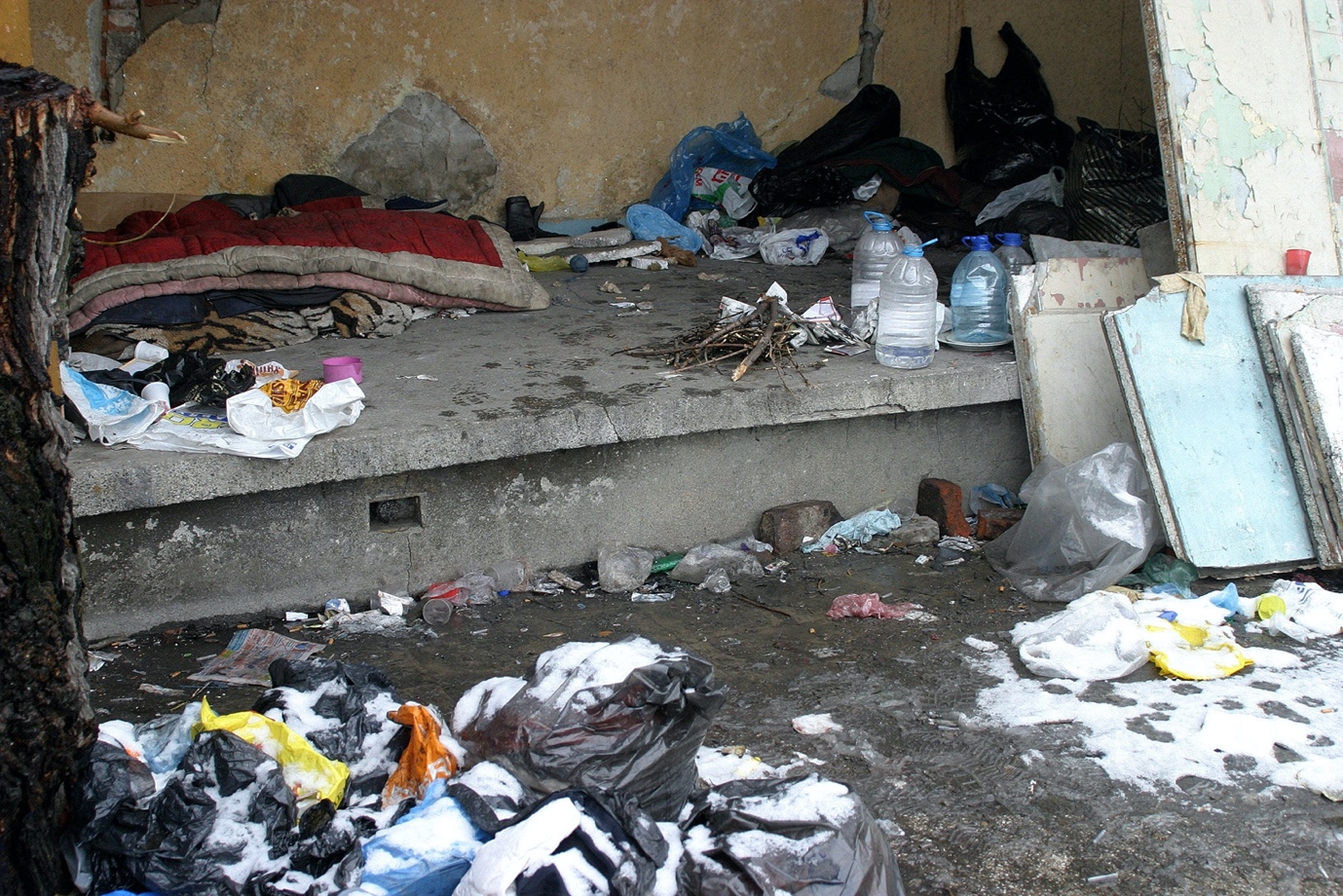
An abandonned squat during the coronavirus confinenement © Edm
“The data on cannabis is suggestive of two competing but related drivers – those buying volumes of cannabis for physical resale have reduced their activities anticipating resale may be more difficult due to social distancing measures. At the same time, established buyers or possibly new buyers who are seeking cannabis for personal use or for use among their social network are increasing their activities on the market.” The report says that, surprisingly, cannabis prices seem to be decreasing for large volume purchases but remaining fairly stable for more normal amounts.
The EMCDDA is worried that there have been increased referrals to encrypted messenger services, which would make it more difficult to monitor what’s happening. It also reports the decline in demand for the types of drugs most used at large social events, presumably because there aren’t any. But this is not small-scale stuff, the report says. “The estimated value of cannabis products sold via Cannazon, a market devoted to cannabis products, reached approximately €4.3-million between January and March 2020, representing a volume of 1.6 metric tonnes.” The report says that some vendors seem to be trying to reassure their customers by telling them that they will maintain a “business as usual” attitude, while for the party drugs they’re trying to stimulate demand through a variety of sales techniques more familiar from grocery sales, such as discounts and lower ‘minimum order’ quantities.
I must admit I was surprised to discover that the darknet drug sellers get reviews from their customers. It gives a whole new meaning to the expression “trip” advisor. The EBCDDA report looked at the period 1 January to 31 March, so admits that things may have changed, but its authors mainly examined the reviews, as well as the level of activity. “Both quantitative and qualitative data were gathered, including vendor listings/posts, buyers’ feedback reports of sales (henceforth called reviews) and posts on forum threads. The darknet markets crawled (to access quantitative and qualitative data) were Agartha, Cannazon and Versus. A total of 50,475 reviews from across the three markets were accessed (Agartha: n=10,126; Cannazon: n=37,433; Versus: n=2,916). Additional qualitative data were accessed, primarily from discussion forums, including dread, hidden answers, the hub 3-forum, envoy forum, didw-forum, club2crd-forum, avengers2-forum, flug-forum; over 850 posts were accessed on these threads.” The aggregated monthly reviews reveal a gradual overall increase in market activity of just over 25%. However, as the report points out, this is mainly down to Cannazon, which saw by far the biggest upsurge in trade.
The report actually looks at sales across the EU, including at that time the UK, from where most of the drugs were sent. The UK is the point of origin for 47% of the sales, with Germany supplying around 30%, with considerably smaller sales from France (6%) and Spain (4%). The rôle of the Netherlands seems to have diminished from previous levels, now standing at 4%. The leading country in satisfying the demand for recreational drugs around the EU would seem to be the UK. “A distribution of the drugs by (a) reported shipping country reveals between-country differences in this market: the United Kingdom is an important point of origin for shipping across all drug classes and predominates for opioids and sedatives (mainly benzodiazepines), with an important role also for the trade of cannabis, cocaine and dissociatives/psychedelics. In this data set Germany is prominent in the non-cocaine stimulants category, probably reflecting its position in respect to amphetamine and methamphetamine use.”
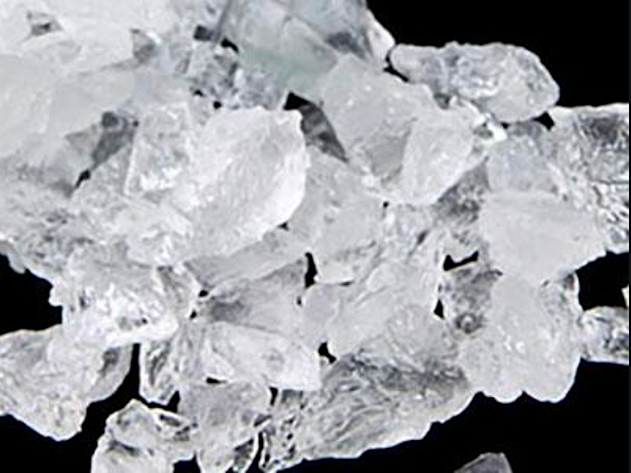
Methamphetamine © emcdda
In the reports analysis, Austria is the biggest supplier of stimulants, with opioids and sedatives mainly coming from the UK. These are relatively small markets, though, compared with cannabis. “The most common weight category of cannabis product sold is 10 g, with a mean price of €125,” says the report. “The most common weight sold in the United Kingdom and Germany was 28 g (one ounce) and 10 g respectively, with corresponding mean prices of €196 and €136. Note that in most of the EU, multiples of 5g are standard whereas in the United Kingdom, this is true for multiples of 7g (quarter of an ounce). The value of cannabis products sold in this market between January–March 2020 is estimated at €4.3-million, representing 1.6 metric tonnes.” That is a lot of weed.
WORDWIDE MARKET
What about other drugs and other countries? With the key months for the opium harvest in Afghanistan being March to June, the 2020 opium harvest is taking place during the Covid-19 crisis and it could be affected if the large labour force needed is not able or willing to travel to the areas where the opium poppy is grown in the country, according to the UNODC. “This may be due to mobility restrictions imposed by the Government or non-state actors, or by the spread of the Covid-19 virus itself, which may deter workers from travelling or reduce the workforce available due to sickness. A shortage of poppy-lancers has already been observed in the western and southern provinces of the country, mainly due to the closure of a border crossing with Pakistan. However, women in poppy-growing households appear to be increasingly engaged in the poppy-lancing process, as do people who lost their jobs due to the Covid-19 crisis. The decline in international trade resulting from the pandemic could also lead to a shortage in the supply of acetic anhydride, a precursor vital to the manufacture of heroin, which is not produced in Afghanistan. Such a shortage could lead to a reduction in the manufacturing of heroin or push it outside the country or even the region.”
When I was last in Afghanistan, there was talk of measures to encourage farmers to grow an alternative crop, but there isn’t one that both suits the dusty soil there and is so valuable on world markets. My Mujahedeen hosts smiled at the idea; the drugs trade was largely keeping them in 7.62 mm ammunition for their Kalashnikovs and Afghanistan is a very big country. Driving back down towards Peshawar from the Khyber Pass, we saw the fortress-like homes of the major drugs barons, some empty and silent, some with prominent armed guards.
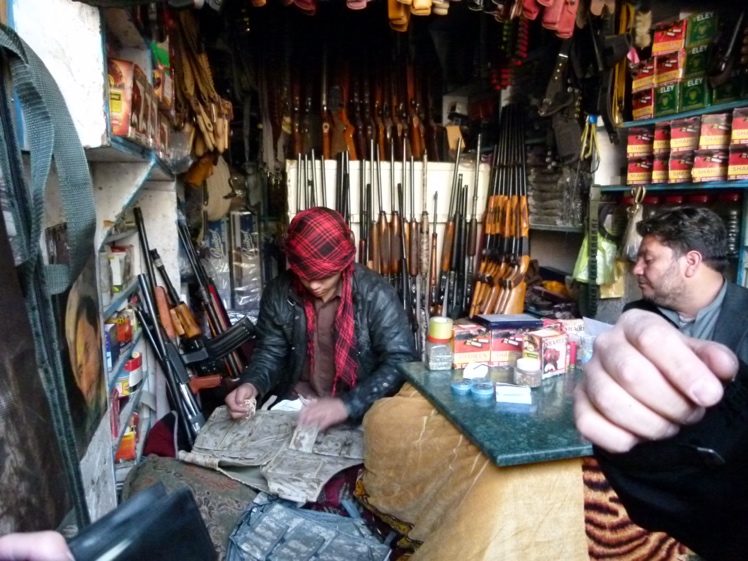
A arms dealer in Afghanistan © Edm
Most people there carried guns or used bodyguards, like a local trade union chief I interviewed, whose two enormous bodyguards were armed with what looked like C96 Mauser machine pistols, even though they were almost certainly replicas manufactured by hand in the workshops of Dara Adamkhel, with a more normal semi-automatic action. Dara Adamkhel is an odd little town where every workshop sells guns, holsters, ammunition or something related to firearms, all made by hand, which putative customers would test by coming out of the little shops and firing into the air. The hitching rails outside made them look like a scene from a western, although it was camels tied to them, not horses. One of the trade unionist’s bodyguards opened the bottles of soft drinks we were offered with his teeth, some of which were metal, I noticed. I was offered a Kalashnikov AK47 to buy, but it was of local manufacture and the action was actually copied from a German World War I Gewehr 98 bolt-action Mauser rifle. I didn’t buy it.
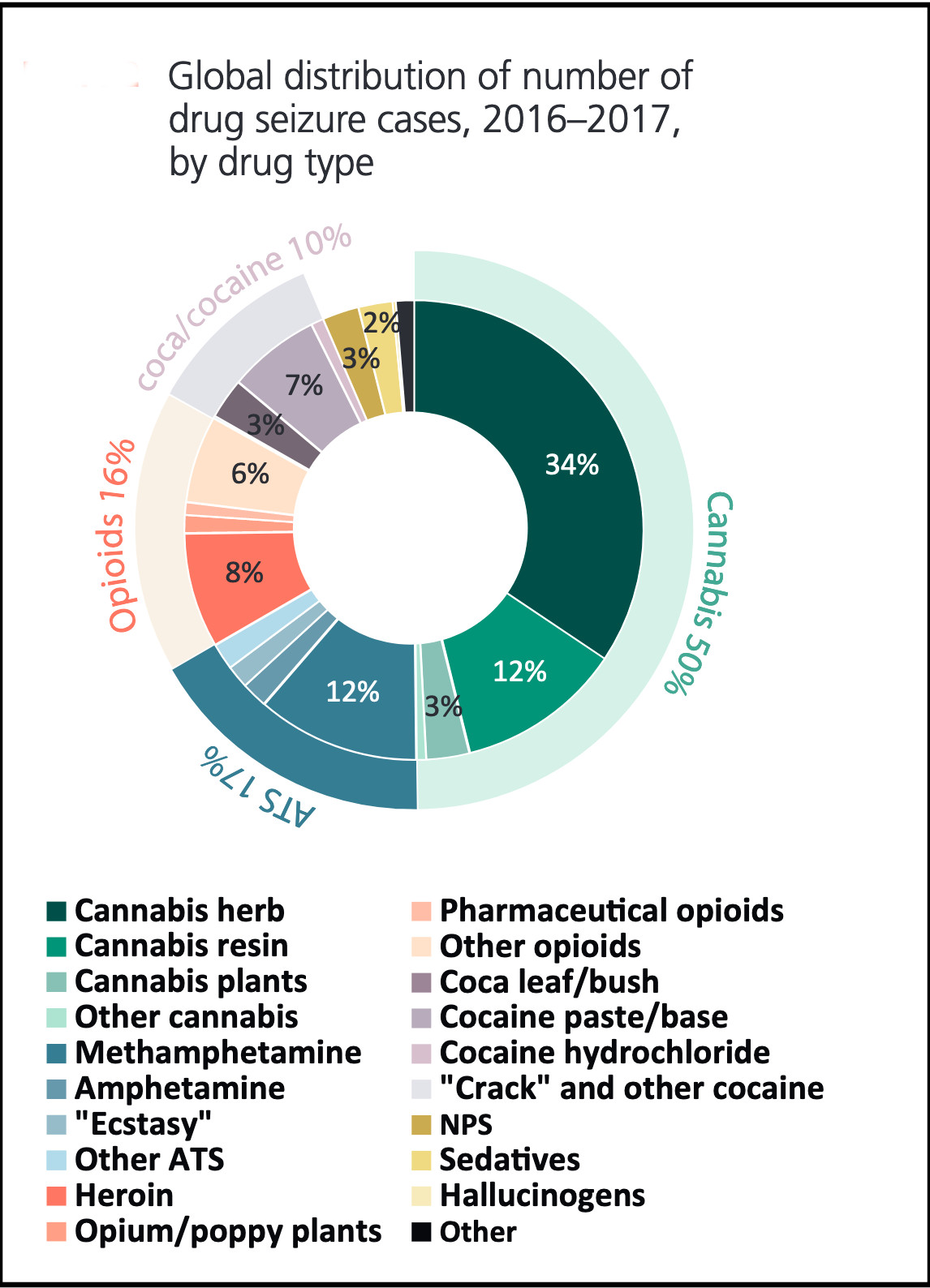
Source: UNODC. The calculations are based on a breakdown of 5.3 million seizures cases reported to UNODC over the period 2016–2017 (2.54 million cases in 2016 and 2.73 million cases in 2017). Seizure case data is based on information from 70 countries for 2016 and 71 countries for 2017.
There are reports that coca plant eradication is Columbia is going ahead and is working at reducing supplies of cocaine. Another blow to its production has been caused by the shortage of petrol, which used to come from Nicaragua and which is needed in cocaine production. Large scale seizures at European ports, however, suggest that trafficking by sea is still going on. Peru reports falling cocaine prices and transportation problems which are affecting output. In Bolivia, the socio-political conflicts of October/November 2019 had already affected the coca leaf market and cocaine production, as the premature withdrawal of the eradication task groups caused a reduction in eradication compared with the previous year. More cocaine on world markets from some countries, less from others, in other words.
But let’s stick with cannabis for now. The UNODC report suggests the market is thriving under lockdown. “Continued large-scale seizures of cannabis products in the Middle East and North Africa suggest that cannabis resin trafficking to Europe is not being disrupted by the restrictions related to the COVID-19 pandemic. There are indications that the lockdown measures in Europe may lead to an increase in demand for cannabis products, which could intensify drug trafficking activities from North Africa to Europe in the future. (The) Local nature of cannabis implies trafficking will remain unaffected. In general, trafficking in cannabis may not be affected in the same way as trafficking in heroin or cocaine, given that cannabis production often takes place near consumer markets and traffickers are thus less reliant on long, transregional shipments of large quantities of the drug.”

In Africa, five countries have legalised cannabis farming for pharmaceutical or industrial use, and a number of companies have formed partnerships with others overseas to produce and export it. Cannabis needs a lot of water, so Uganda is an ideal country in which to grow it. Wages are low, too, so it’s cheap, but it’s also grown in Lesotho, Malawi, Zimbabwe and Ghana. Two types of cannabis are grown in Africa, depending on the location: the industrial type, which is tall and contains very little of the psychoactive ingredient, tetrahydrocannabinol (THC), while the other – familiar from windowsills in top floor Amsterdam apartments – is short, with a lot of leaves. It, of course, is rich in THCs and goes to pharmaceutical companies. The industrial kind produces hemp, for use in rope-making and textiles, the other is used in various medicines. Presumably (although it hasn’t been proved), some slips out to be used by people who want to smoke it, which people in Africa have been doing since at least the 14th century. However, it’s only in South Africa that it’s legal to smoke the stuff, as The Economist explained: “A court ruled that prohibition violated the right to privacy”.
STOP ME AND BUY ONE
Meanwhile, darknet trading continues, largely untouchable, says the EMCDDA report. “The overall increase in sales evident on the three darknet markets examined is reflected in an increase in drug-related discussions on forums around darknet markets over the monitoring period (January–March 2020). Many vendors have tried to convey to buyers that they are operating ‘business as usual’, without delays to delivery. For example:
Eutyone, New batch available. 500kg in stock.
2. 4fbca, 5faec-2201, New Synthetic Cannabinoids.
3. 5cladba, hep, sgt78, mdpep, always stock available, stable supply.
4. Etizolam, Only 1kg in stock.
Now delivery to USA, Canada, UK no delayed for corona virus.
And there are more, in case you’re worried. The report lists several. Here is another example:
We provide one of the best quality Cocaine that you can find right now in Europe!
+ It is shipped from a calm (drug trading) wise country!
*Our product is not from Germany or Netherlands!!!
*Everything what we sell goes straight from brick.
*Transported directly to us by Ship.
*Never Bashed.
*Never Cutted.
To keep you safe from getting caught, every order is send in a
decoy. Our packages easily go through X-RAY scans and dogs.
Many double-checks before sending!
As I mentioned, all orders are send from a calm (drug-trading) wise country in
Europe. So there is a significantly higher chance that it will not get caught in a post or by shipping with courier. (Mostly HOT zone countries posts are getting more checks from customs before letting packages go through)
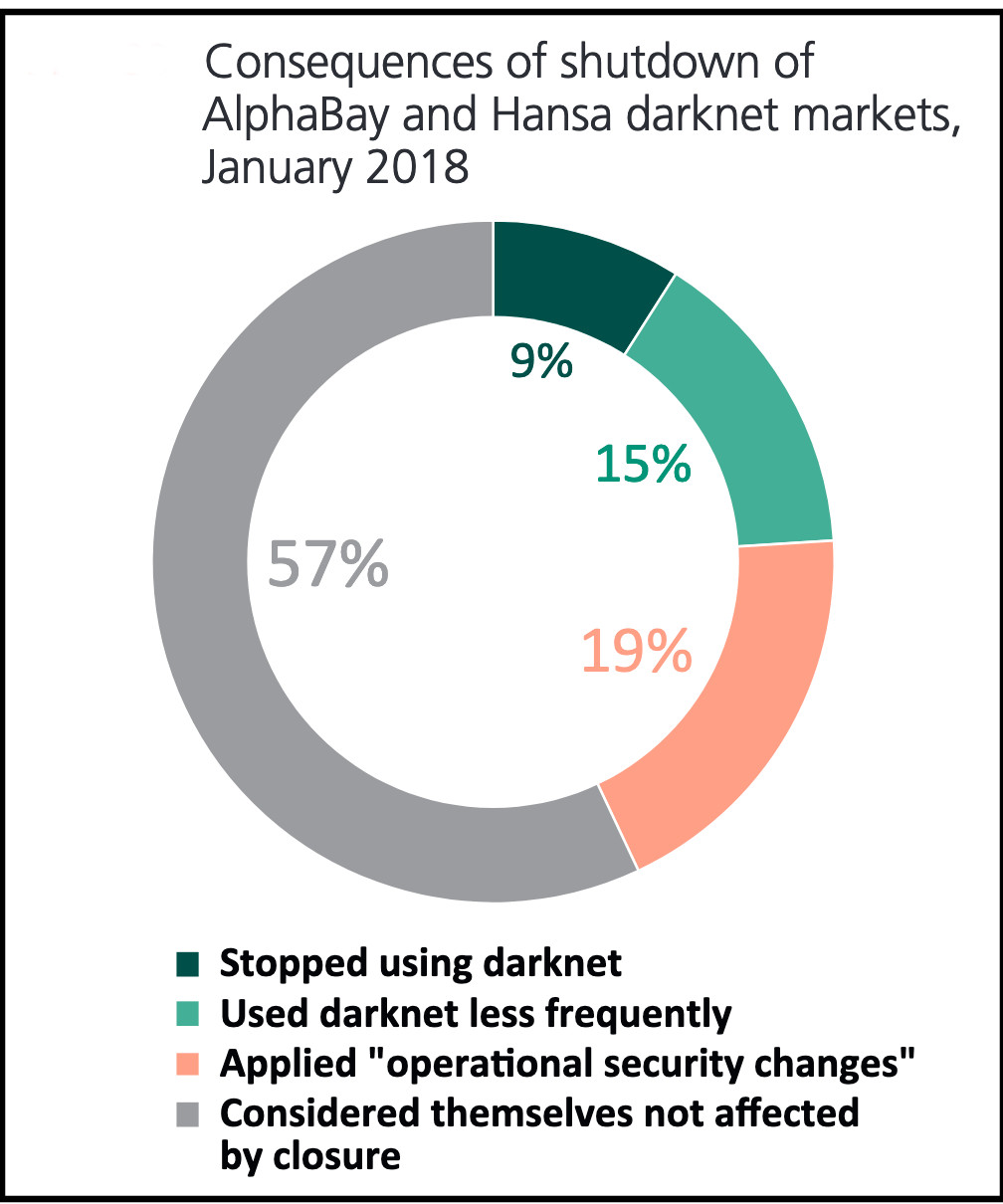
Source: UNODC calculations based on Global Drug Survey 2018 data: detailed findings on drug cryptomarkets. Available from Dr. Monica Barratt, Drug Policy Modelling Program, National Drug and Alcohol Research Centre, Australia.
That must make reassuring reading for the darknet’s customers, even if the spelling and punctuation are highly suspect (and who would want a package that had ‘been through a dog’?). Still, some of the traders have been flagging up the difficulties they’re facing during the pandemic, presumably to encourage the sense of urgency regular users may be feeling. Perhaps business isn’t quite as brisk as the ENCDDA and its law enforcement EU partner, Europol, actually fear.
According to Ireland’s Drug and Alcohol Information and Support website, the problems there are much the same as in the rest of Northern Europe. “Cannabis is the most widely used drug in Europe and accounts for almost 40% of the entire drug market, according to a new EU drugs report,” it says. “The estimated market value of cannabis is €9.3-billion annually. This is within a range of €8.4 to €12.9-billion. It is followed by heroin – which is worth an estimated €6.8-billion (between €6 and €7.8-billion) and is responsible for a significant proportion of drug-related deaths and social costs. This is followed by cocaine (€5.7-billion), amphetamine (€1.8-billion) and MDMA/ecstasy (€0.67-billion). New psychoactive substances are also a serious and growing market, but due to large number of different substances falling under this heading and the speed with which new products are introduced – it’s difficult to put a market value on their worth.”
There are other drugs, of course, the synthetic ones often produced in domestic kitchens or small commercial premises, which, as the UNODDC mentions, have remained unchanged during the pandemic. “Where there is domestic manufacture using domestic precursors, as is the case of mephedrone and other popular synthetic drugs in the Russian Federation, no major impact on the domestic drug market is visible.” In the European Union, synthetic drugs are mainly seen as party drugs and it appears that their production has diminished, almost certainly because of the global pandemic. “Synthetic drug production in the European Union (amphetamine, MDMA and methamphetamine) relies on chemicals imported from East Asia,” says the UNODDC, “and partly on chemicals trafficked within Europe. In the Czech Republic, the closure of borders has led to a reduction in the availability of precursors for methamphetamine production and a lack of methamphetamine in the market is expected.”
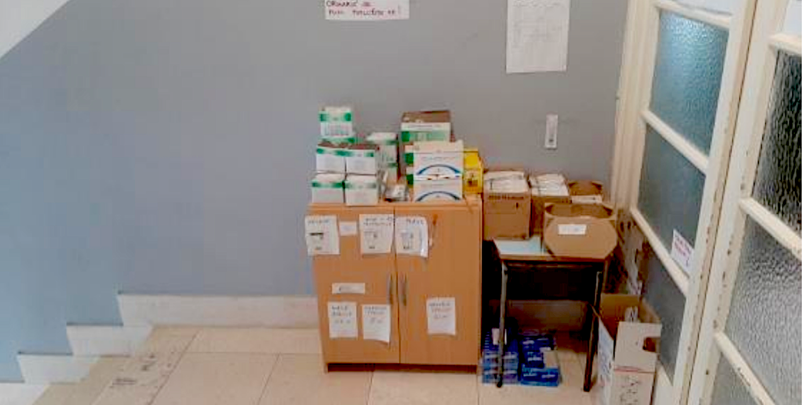
Self-service spot providing harm reduction material,managed by clients themselves,in a low-threshold service in Split,Croatia,during the COVID-19pandemic © Nevenka Mardešić, HELP Association
Even an apparent decrease in drug use may not be the good news it seems at first glance. “Drug supply shortages can go together with an overall decrease in consumption (for example, of drugs that are mostly consumed in recreational settings such as bars and clubs)” says the says the UNODC Research Brief, “but may also, especially in the case of heroin, lead to the consumption of harmful domestically-produced substances, as well as more harmful patterns of drug use by people with drug use disorders. In terms of alternatives, some countries in Europe have warned that heroin users may switch to substances such as fentanyl and its derivatives. An increase in the use of pharmaceutical products such as benzodiazepines and buprenorphine has also been reported, to the extent that their price has doubled in some areas.”
GETTING LOW, GETTING HIGH
The long-term effect of the coronavirus crisis is hard to predict, but increased poverty looks likely to be the outcome for many. While glum people in rich countries try to cheer themselves up with narcotics, the people living in poor countries may be increasingly pressured, by gangsters or just by circumstances, into producing more drugs. The UNODC thinks things could be especially bad in Latin America. “Latin America is expected to suffer the worst economic crisis in its history, with a contraction of 5.3per cent, comparable only to the Great Depression of 1930 (5.0 per cent reduction). The economy of Mexico, the third largest producer of opium poppy worldwide, is expected to contract even further than the regional and global average (by 6.5 per cent), as the economy of the United States, its main commercial partner, is also expected to shrink. In Colombia, Peru and the Plurinational State of Bolivia, the Andean countries that produce almost all coca worldwide, the economy is expected to shrink by 2.6, 4.0 and 3.0 per cent, respectively. In Latin America overall, based on conservative estimates, the percentage of people living below the poverty line is expected to increase by 4 percentage points (from 30 to 34 per cent), and extreme poverty by 2 percentage points (from 11 to 13 per cent), mostly because of the inadequate social protection systems in the region.”
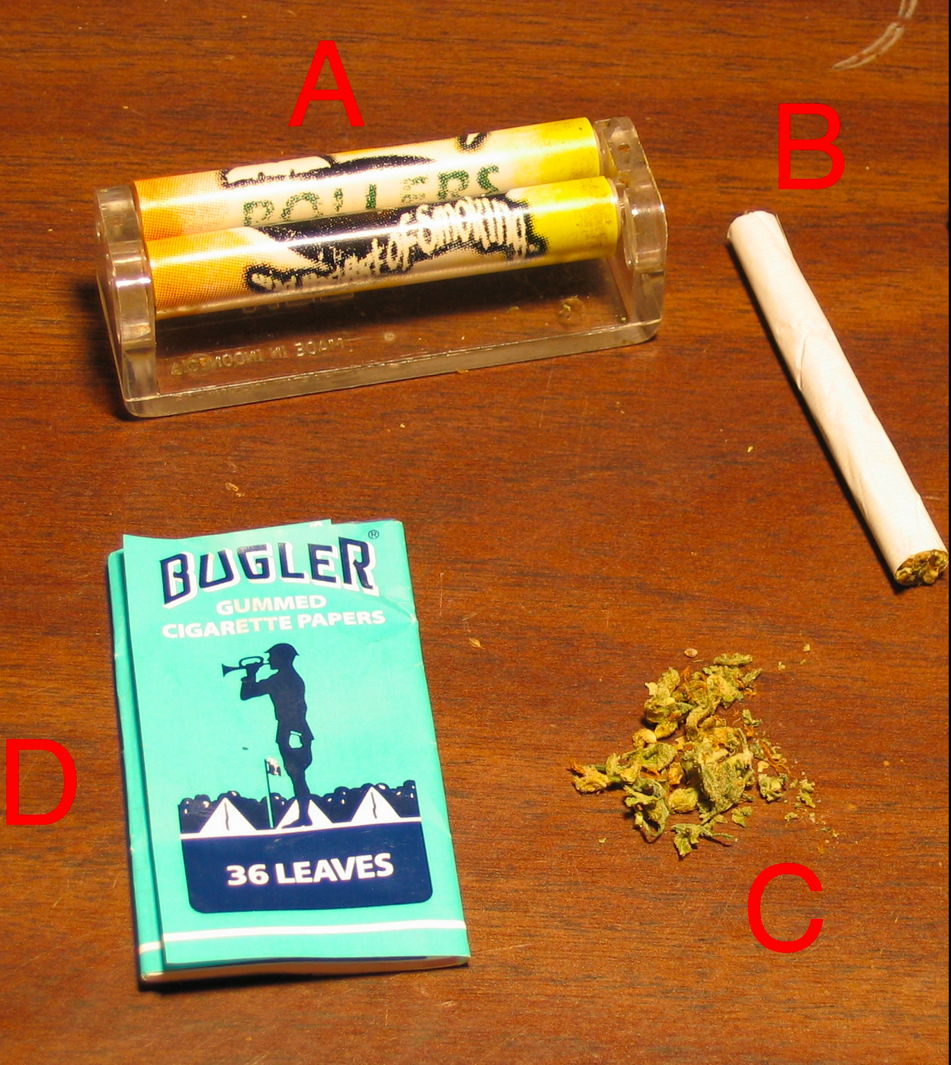
(A) Rolling machine (B) Cannabis spliff or joint (C) Broken up Cannabis (D) Book of rolling papers
People will always be willing to turn to growing drugs when their options shrink. Years ago, I went to report on banana production in the Caribbean, at a time when growers were protected under what was then the EU’s Lomé Convention (now called the Cotonou Partnership), which gave them some protection from disaster, helping out in the event of hurricane damage and giving them easy market access into the EU for their product. The United States had raised an objection at the WTO, claiming it unfairly discriminated against what were called ‘dollar bananas’ – bananas grown on US-owned plantations on the South American continent. The US won its case and the Lomé Convention arrangements were scrapped. It hadn’t happened by the time I interviewed a small farmer in St. Lucia, whose bananas were packed on the farm for Marks and Spencer in the UK. Bananas provide a year-round income, not a single or double harvesting season, so they are a unique crop for a small family business where very hilly conditions rule out more conventional food plants. “What will you do if it’s no longer profitable to grow bananas?” I asked. He shrugged. “It’s good soil and a good climate for coca leaves,” he replied, “after all, it’s not far from here to the United States.” I wonder if he ever did switch to coca? Sadly, I suspect the drug barons are harsher people to work for than Fyffe’s.
It’s ironic, really. The scientific community and health professionals are looking for drugs to treat or prevent Covid-19 while a lot of other people are looking for drugs to help them forget about it. The measures put in place to control the spread of the coronavirus are undoubtedly having an effect on the drugs market. In most cases, more are being seized at ports and on borders because of more cautious checks. The traffickers are likely to adapt and there are signs that some are now distributing drugs in the mail. There have also been reports of dealers dressing as medical personnel to evade police checks. There seems little doubt that the use and supply of illicit drugs will change as a result of the pandemic, even if nobody knows exactly how. Of one thing you can be certain, though: whether it’s through the darknet or from a street deal or that man you ring up whose real name you don’t know, the drugs trade will continue. The dealers will continue to deal, the users will continue to use. Even in a crisis such as the one we’re living through, Timothy Leary’s instruction for an enjoyable life will go on being followed by many.
Robin Crow
Click here to read the 2020 June edition of Europe Diplomatic Magazine


